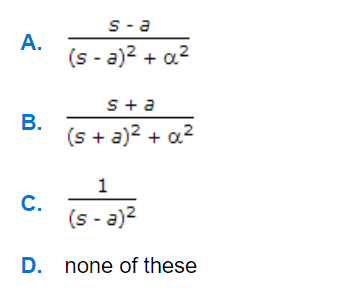Question

a.
A
b.
B
c.
C
d.
D
Posted under Electronics and Communication Engineering
Interact with the Community - Share Your Thoughts
Uncertain About the Answer? Seek Clarification Here.
Understand the Explanation? Include it Here.
Q. Laplace transform of e^(at) cos (at) is
Similar Questions
Explore Relevant Multiple Choice Questions (MCQs)
Q. The value of the following equation in + ve sense is
View solution
Q. The amplitude of the first odd harmonic of the square wave shown in the given figure is
View solution
Q. The inverse Laplace transform of 1 / (s+1)³ is
View solution
Q. The final value of following is
View solution
Q. Let the Fourier transform of y(n) be given by below equation, then y(e^(j0)) is
View solution
Q. The value of following Integral is equal to
View solution
Q. The z transform of sequence x[n] = {2, 4, 3, 2}
View solution
Q. For the function u(t - a) = 0 for t < a and u(t - a) = 1 fort ≥ a, the Laplace transform is
View solution
Q. Consider the following statements :
View solution
Q. The value of following Integral is equal to
View solution
Q. Consider the following two statements :
View solution
Q. A rectangular pulse train s(t) is shown in figure is convolved with the signal cos²(4π x 10³t). The convolved signal will be a
View solution
Q. The z-transform of sequence n x x[n] is
View solution
Q. The inverse Laplace transform of
View solution
Q. The function f(t) in the given figure will have its Laplace transform as
View solution
Q. The joint probability function of two discrete random variable X and Y is given by following equation. Then E(X) =
View solution
Q. The effective value of the waveform in the given figure is
View solution
Q. Which one of following is a static system?
View solution
Q. The Laplace transform of unit ramp function starting at t = a is
View solution
Q. If i(t) is a time varying current, then following is
View solution
Recommended Subjects
Are you eager to expand your knowledge beyond Electronics and Communication Engineering? We've handpicked a range of related categories that you might find intriguing.
Click on the categories below to discover a wealth of MCQs and enrich your understanding of various subjects. Happy exploring!








